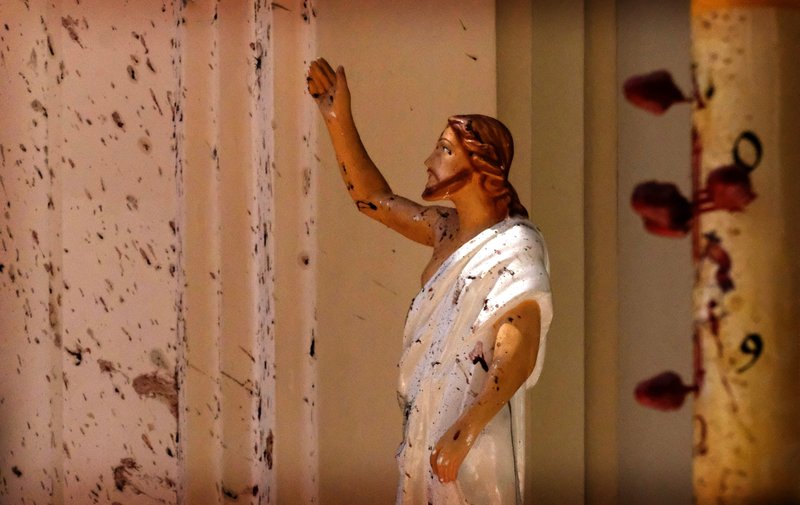COLOMBO, Sri Lanka -- More than 200 people were killed and hundreds more wounded in eight bomb blasts that rocked churches and luxury hotels in Sri Lanka on Easter Sunday -- the deadliest violence the South Asian island country has seen since a bloody civil war ended a decade ago.
Defense Minister Ruwan Wijewardena described the bombings as a terrorist attack by religious extremists, and police said 13 suspects were arrested, though there was no immediate claim of responsibility. Wijewardena said most of the blasts were believed to have been suicide attacks.
The explosions at three churches and three hotels -- most of them in or around Colombo, the capital -- collapsed ceilings and blew out windows, killing worshippers and hotel guests.
Most of those killed were Sri Lankans. But the three hotels and one of the churches, St. Anthony's Shrine, are frequented by foreign tourists, and Sri Lanka's Foreign Ministry said the bodies of at least 27 foreigners from a variety of countries were recovered. The U.S. said "several" American were among the dead, while Britain and China said they, too, lost citizens.
Prime Minister Ranil Wickremesinghe said he feared the massacre could trigger instability in Sri Lanka, a country of about 21 million people, and vowed to "vest all necessary powers with the defense forces" to take action against those responsible.
The government imposed a nationwide curfew from 6 p.m. to 6 a.m. and blocked Facebook and other social media, saying it needed to curtail the spread of false information and ease tension.
The Archbishop of Colombo, Cardinal Malcolm Ranjith, called on Sri Lanka's government to "mercilessly" punish those responsible "because only animals can behave like that."
Police spokesman Ruwan Gunasekara said at least 207 people were killed and 450 wounded. He said police found a safe house and a van used by the attackers.
The scale of the bloodshed recalled the worst days of Sri Lanka's 26-year civil war, in which the Tamil Tigers, a rebel group from the ethnic Tamil minority, sought independence from the Buddhist-majority country. During the war, the Tigers and other rebels carried out a multitude of bombings. The Tamils are Hindu, Muslim and Christian.
Sri Lanka, situated off the southern tip of India, is about 70 percent Buddhist, with the rest of the population Muslim, Hindu or Christian. While there have been scattered incidents of anti-Christian harassment in recent years, there has been nothing on the scale of what happened Sunday.
There is also no history of violent Muslim militants in Sri Lanka. However, tensions have been running high more recently between hard-line Buddhist monks and Muslims.
Two Muslim groups in Sri Lanka condemned the church attacks, as did countries around the world, and Pope Francis expressed condolences at the end of his traditional Easter Sunday blessing in Rome.
"I want to express my loving closeness to the Christian community, targeted while they were gathered in prayer, and all the victims of such cruel violence," Francis said.
Six nearly simultaneous blasts took place in the morning in Colombo at St. Anthony's Shrine -- a Catholic church -- and the Cinnamon Grand, Shangri-La and Kingsbury hotels. After a lull of a few hours, two more explosions occurred at St. Sebastian Catholic church in Negombo, a mostly Catholic town 23 miles north of Colombo, and at the Protestant Zion church in the town of Batticaloa, about 190 miles to the east.
Three police officers were killed while conducting a search at a suspected safe house in Dematagoda, on the outskirts of Colombo, when its occupants apparently detonated explosives to prevent arrest, Wijewardena said.
Sri Lankan forces defeated the Tamil Tiger rebels in 2009, ending a civil war that took over 100,000 lives, with both sides accused of grave human rights violations.
Associated Press writers Sheila Norman-Culp and Gregory Katz in London; Sarah DiLorenzo in New York; Jon Gambrell in Dubai, United Arab Emirates; Vladimir Isachenkov in Moscow; Nicole Winfield at the Vatican; Adam Schreck in Bangkok; and Emily Schmall in New Delhi contributed to this report.
International on 04/22/2019